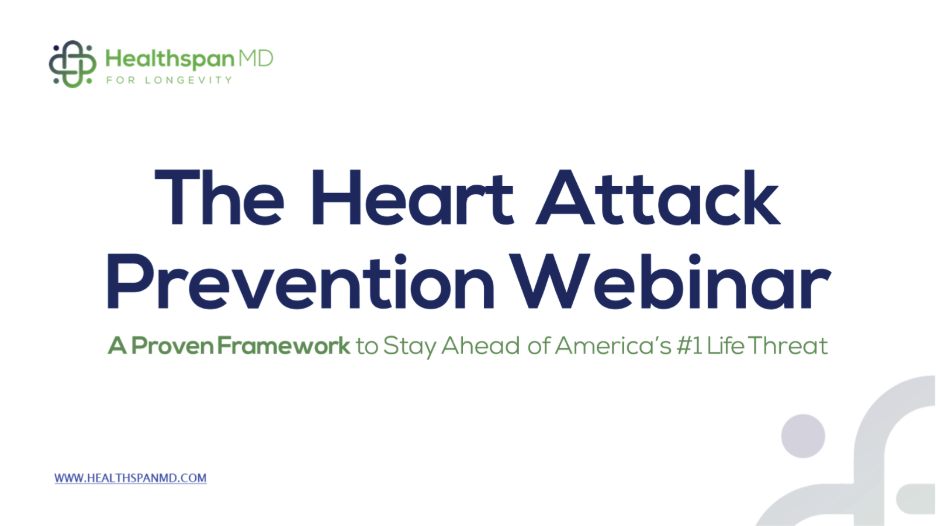If you’ve been told you have a blockage, high calcium score, or "moderate" heart disease, but your doctor says, "We’ll wait until it gets worse before doing anything"…
It’s time to question that advice.
Featured Webinar Question below: “I have a moderate blockage and was told they won't do anything until I get a 70% blockage. They just put me on cholesterol medication. What now?”
That’s the outdated standard.
At HealthspanMD, we use advanced diagnostics and root-cause care to help you stabilize, slow, and often reverse heart disease, without surgery or stents.
In case you missed it, you can still catch the replay of our Heart Attack Prevention webinar from October 17th!

Register here to watch the full webinar recording
In this session, we’ll break down:
- Why the traditional system fails. Why annual checkups, stents, and “normal” labs aren’t enough to prevent the #1 killer and how the system is profiting while patients pay the price.
- 3 proven steps to heart attack prevention. The personalized, proactive strategy Dr. Hurst uses to stop heart attacks before they happen.
- How to take control of your risk starting today. Why relying on luck, good habits, or meds isn’t enough. Learn the tests and data that give you clarity and peace of mind.
The Science on Stents:

If you're not actively having a heart attack, stents do not reduce your risk of death or future heart attacks compared to lifestyle and medical therapy alone.
Multiple major studies have confirmed this:
- COURAGE Trial (2007) – No survival or heart attack benefit with PCI in stable CAD.
- ORBITA Trial (2018) – PCI showed no significant symptom relief vs placebo procedure in stable angina.
- ISCHEMIA Trial (2020) – Invasive treatments didn't outperform conservative care in reducing cardiac events.
- BARI-2D Trial (2009) – In people with diabetes and stable heart disease, immediate revascularization didn’t lower mortality compared to medical management.
Even the symptom relief many associate with stents may be largely due to placebo effect.
Stents can still save lives during an acute heart attack, but for stable heart disease, the smarter strategy is aggressive, root-cause-focused care.
Many people are undergoing invasive procedures they may not need. Not because they’re out of options, but because traditional cardiology isn't built to deliver aggressive, proactive artery disease management.
We see it all the time: People in their 60s, 70s, even 80s, told they were “managing” their disease and would need a stent to do so.
Featured Webinar Audience Question
“I have a moderate blockage and was told they won't do anything until I get a 70% blockage. They just put me on cholesterol medication. What now?”
Dr. Hurst's Answer: “ It’s good news that your blockage isn’t more severe. But the common "wait until it gets worse" message reflects what we call Medicine 2.0, a reactive approach, that waits until damage is done before taking meaningful action.
At HealthspanMD, we don’t wait. We act.
Our goal is to stabilize or even reverse plaque progression through precision medical and lifestyle treatment, long before it reaches the point of needing a procedure.
Why “Waiting for 70%” Isn’t the Whole Story
Procedures like stents and bypass surgery can be lifesaving when needed. But they also carry risks: heart attack, stroke, clotting, complications from blood thinners.
And for moderate blockages that aren’t causing symptoms, research shows stents don’t prevent heart attacks or extend life, but optimizing your biology does.
A Better Goal: Prevention and Regression
The smarter approach is to make plaque safer and less likely to rupture by targeting the root causes of artery disease.
What you Can Do Today – A Potential Alternative Plan for Stents
If you’ve been told you need a stent, and you’re not actively having a heart attack, here are the steps we recommend:
- Don’t rush into a procedure. Unless it’s an emergency, you have time to explore your options.
- Get a full risk assessment. That means advanced imaging (like coronary CT angiogram), inflammatory and metabolic testing, and a full symptom review to understand your true risk.
- Review the evidence. Learn what the major clinical trials show about stents in stable heart disease (hint: no reduction in future heart attack or death).
- Address root causes. That includes:
- Optimizing cholesterol, blood pressure, and blood sugar
- Reducing inflammation and insulin resistance
- Improving sleep, stress, nutrition, and movement
- Build a comprehensive plan. This should involve a coordinated care team focused on reversing disease—not just managing symptoms.
- Track your progress. Reassess over time with updated labs, imaging, and clinical outcomes to see how your arteries are responding.
Featured Healthspan Podcast:

If you or someone you love has had a heart attack, stent, bypass, or high calcium score, this episode is for you. In this episode, Dr. Robert Todd Hurst, MD, FACC, FASE breaks down the 10 most critical facts about coronary artery disease (CAD), from understanding the real risks, to reversing progression through precision treatment, to the surprising link between muscle mass, insulin resistance, and heart health. You’ll learn what your doctor may not have told you, and how to protect your heart with the best available science and strategy.
Take the First step towards your Heart Attack Prevention Plan and speak with our team
Here’s what you get when you join HealthspanMD:
If you’ve had a stent, a scare, or a high calcium score but want to avoid more procedures… If you’ve been told, “Everything looks fine” but your gut says otherwise… If you want to know your true risk and do everything possible to protect your future…
- A full Healthspan Assessment with in-depth labs, advanced imaging, DEXA body scan, VO2 max, metabolic and inflammation testing
- One-on-one consults with a preventive cardiologist, internal medicine doctor, physical therapist, nutritionist, and sleep/stress coach
- A personalized plan built around your biology, your risks, and your goals
- Expert guidance to help reverse insulin resistance, reduce inflammation, stabilize or reverse plaque, and lower your risk of stroke, heart attack, and dementia
- Regular follow-ups, coaching, and adjustments to keep you on track
- Peace of mind from a plan that works, with a team who truly listens and stays with you
This isn’t a prescription refill and "see you in six months." It’s a proactive partnership designed to help you live longer, feel stronger, and protect your independence for years to come.
Disclaimer: This content is for informational purposes only and is not intended as medical advice. Always consult your physician before making changes to your treatment plan or delaying recommended procedures. HealthspanMD provides second opinions and proactive care options, but urgent or emergency situations require immediate medical attention. Individual results may vary.
Sources:
- Boden WE, et al. Optimal Medical Therapy with or without PCI for Stable Coronary Disease (COURAGE Trial). N Engl J Med. 2007;356:1503-1516.
- Al-Lamee R, et al. Percutaneous Coronary Intervention in Stable Angina (ORBITA Trial). Lancet. 2018;391(10115):31-40.
- Maron DJ, et al. Initial Invasive or Conservative Strategy for Stable Coronary Disease (ISCHEMIA Trial). N Engl J Med. 2020;382:1395-1407.
- BARI-2D Study Group. Bypass Angioplasty Revascularization Investigation 2 Diabetes (BARI-2D Trial). N Engl J Med. 2009;360:2503-2515.
- Stergiopoulos K, Brown DL. Initial Coronary Stent Implantation with Medical Therapy vs Medical Therapy Alone in Stable CAD. JAMA Intern Med. 2012;172(4):312–319.
- NIH News Release: Stents and Bypass Surgery No Better Than Medication for Stable Heart Disease. November 2019. nih.gov








.png)
